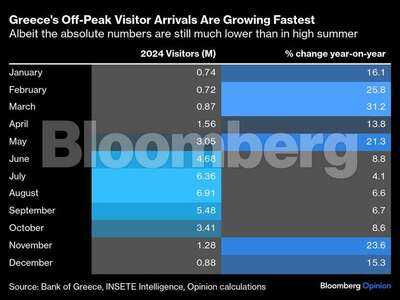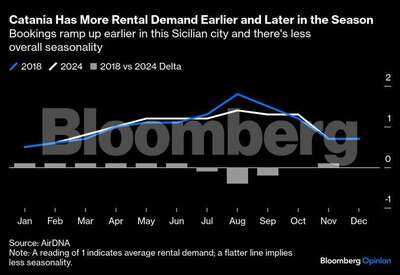For a growing number of holidaymakers, the rational response to the intense heat, high prices and overcrowding that blight the Mediterranean in July and August is to visit in the spring or fall. After all, the weather is cooler, hotels are better value and the vibe is more relaxed.
This so-called “shoulder season” travel is booming. The trend could help ameliorate overtourism while boosting the use of aircraft and accommodation during the normally fallow winter months. But this rebalancing won’t happen without a coordinated industry effort to keep resorts open and highlight the attractions of off-peak travel. Oh, and more flexible school holidays would also help.
Europe is once again anticipating an influx of wealthy American visitors this year, but if they’re sensible, those unrestricted by the school calendar will delay their visit until the autumn.
Since the Covid-19 pandemic, Delta Air Lines Inc. has seen a “multi-year” “systematic shift” of US demand for European trips from July and August into the shoulder periods “as consumers look to avoid peak crowds and summer heat,” its president, Glen Hauenstein, told investors earlier this month. “The peak is getting less peaky and the shoulders are getting stronger,” he said.
While anti-tourist protests and sweltering weather in southern Europe haven't impacted UK budget carrier EasyJet Plc’s peak summer bookings, it’s benefiting from more demand in the shoulder season. The final quarter of the calendar year has historically been loss-making, but there’s hope for generating profits in the future thanks in part to the elongation of summer into October, Chief Executive Officer Kenton Jarvis told analysts in May.
Greek carrier Aegean Airlines SA has also seen its financial performance improve in the October to December period amid more travel to and from Athens and Thessaloniki, which it attributes in part to climate change and milder winter temperatures creating a “gradual smoothing” of demand, Chairman Eftichios Vassilakis said in March.
Inbound travelers to Greece increased 24% year on year in November, according to the Bank of Greece, while monthly travel receipts jumped 45% to €618 million ($727 million). American visitors to Greece boosted their spending that month by 78% and accounted for almost one-fifth of the total.

Europe’s short-term rental market is also seeing more demand in the autumn, according to AirDNA which tracks listings on Airbnb and Vrbo; nights booked jumped 18% year on year in October 2024 and were 31% higher than the total in October 2019. Holidaymakers are taking advantage of lower off-season rates to book more upscale properties, and peak summer now represents a smaller share of total annual demand in popular vacation destinations as the chart below shows.
 Amid evacuations due to summer wildfires and the Acropolis having to close during periods of extreme heat, I’m not surprised several travel firms now report more bookings in September than during peak summer.
Amid evacuations due to summer wildfires and the Acropolis having to close during periods of extreme heat, I’m not surprised several travel firms now report more bookings in September than during peak summer.
Selling active holidays in July and August can be challenging, according to Ben Colbridge, product and commercial director for Exodus Adventure Travels, whose offer includes hiking, cycling and cultural trips. “Most people don’t want to be doing that sort of thing if the temperatures are above 40C,” he told me, and those who must travel in July and August are increasingly picking cooler, northern destinations such as Scandinavia.
Exodus’s main European travel period used to run from May until the middle of October, but it’s seeing a “creep at the edges” extending the season from April through the end of October. “Going forward we will start to push into the beginning of November in southern Europe,” he said, while acknowledging that airline capacity in the shoulder season remains a limiting factor.
 Indeed, this nascent shift will only succeed if the travel industry coordinates to make off-peak visits more available and appealing, while being sensitive to local residents’ concerns that this will cause an increase in overall demand (rather than just redistributing guests from the summer peak).
Indeed, this nascent shift will only succeed if the travel industry coordinates to make off-peak visits more available and appealing, while being sensitive to local residents’ concerns that this will cause an increase in overall demand (rather than just redistributing guests from the summer peak).
Convincing restaurants, transport services and attractions to remain open longer isn’t easy either. Seasonal workers often depart, and what if visitors don’t come?
“Prioritizing staff retention through flexible scheduling, short-term contract extensions, or end-of-season incentives is key to maintaining service quality,” notes the nonprofit European Travel Commission.
Resorts also need to offer more than just a sun lounger in case the weather turns inclement — culture, nature, sporting and wellness offers are essential. For example, German travel giant Tui AG is trying to appeal to runners by sponsoring marathons on Rhodes, Majorca and Cyprus in the off-season (and offering shorter races for accompanying family members).
It would help, too, if families could be more flexible in their travel dates. Schools in England traditionally have a six-week summer holiday, but some institutions are opting for a shorter hiatus. As well as easing childcare pressures and the potential educational benefits (kids forget much of what they’ve learned after a long break), this would mean the October half-term could be extended to a fortnight instead of one week — as is already the norm in Germany.
The German school holiday system — which is also staggered by region to lessen the bunching of vacation bookings — is no panacea, though. Flights during the autumn half-term are often extortionate as this Berlin-based columnist can confirm.
Yet after experiencing the delights of Sicily in late October — when the beach was comparatively empty and the sea still invitingly warm — I’ve decided “shoulder season” vacations are the way forward. Please don’t tell everybody.
This so-called “shoulder season” travel is booming. The trend could help ameliorate overtourism while boosting the use of aircraft and accommodation during the normally fallow winter months. But this rebalancing won’t happen without a coordinated industry effort to keep resorts open and highlight the attractions of off-peak travel. Oh, and more flexible school holidays would also help.
Europe is once again anticipating an influx of wealthy American visitors this year, but if they’re sensible, those unrestricted by the school calendar will delay their visit until the autumn.
Since the Covid-19 pandemic, Delta Air Lines Inc. has seen a “multi-year” “systematic shift” of US demand for European trips from July and August into the shoulder periods “as consumers look to avoid peak crowds and summer heat,” its president, Glen Hauenstein, told investors earlier this month. “The peak is getting less peaky and the shoulders are getting stronger,” he said.
While anti-tourist protests and sweltering weather in southern Europe haven't impacted UK budget carrier EasyJet Plc’s peak summer bookings, it’s benefiting from more demand in the shoulder season. The final quarter of the calendar year has historically been loss-making, but there’s hope for generating profits in the future thanks in part to the elongation of summer into October, Chief Executive Officer Kenton Jarvis told analysts in May.
Greek carrier Aegean Airlines SA has also seen its financial performance improve in the October to December period amid more travel to and from Athens and Thessaloniki, which it attributes in part to climate change and milder winter temperatures creating a “gradual smoothing” of demand, Chairman Eftichios Vassilakis said in March.
Inbound travelers to Greece increased 24% year on year in November, according to the Bank of Greece, while monthly travel receipts jumped 45% to €618 million ($727 million). American visitors to Greece boosted their spending that month by 78% and accounted for almost one-fifth of the total.
Europe’s short-term rental market is also seeing more demand in the autumn, according to AirDNA which tracks listings on Airbnb and Vrbo; nights booked jumped 18% year on year in October 2024 and were 31% higher than the total in October 2019. Holidaymakers are taking advantage of lower off-season rates to book more upscale properties, and peak summer now represents a smaller share of total annual demand in popular vacation destinations as the chart below shows.
 Amid evacuations due to summer wildfires and the Acropolis having to close during periods of extreme heat, I’m not surprised several travel firms now report more bookings in September than during peak summer.
Amid evacuations due to summer wildfires and the Acropolis having to close during periods of extreme heat, I’m not surprised several travel firms now report more bookings in September than during peak summer. Selling active holidays in July and August can be challenging, according to Ben Colbridge, product and commercial director for Exodus Adventure Travels, whose offer includes hiking, cycling and cultural trips. “Most people don’t want to be doing that sort of thing if the temperatures are above 40C,” he told me, and those who must travel in July and August are increasingly picking cooler, northern destinations such as Scandinavia.
Exodus’s main European travel period used to run from May until the middle of October, but it’s seeing a “creep at the edges” extending the season from April through the end of October. “Going forward we will start to push into the beginning of November in southern Europe,” he said, while acknowledging that airline capacity in the shoulder season remains a limiting factor.
Convincing restaurants, transport services and attractions to remain open longer isn’t easy either. Seasonal workers often depart, and what if visitors don’t come?
“Prioritizing staff retention through flexible scheduling, short-term contract extensions, or end-of-season incentives is key to maintaining service quality,” notes the nonprofit European Travel Commission.
Resorts also need to offer more than just a sun lounger in case the weather turns inclement — culture, nature, sporting and wellness offers are essential. For example, German travel giant Tui AG is trying to appeal to runners by sponsoring marathons on Rhodes, Majorca and Cyprus in the off-season (and offering shorter races for accompanying family members).
It would help, too, if families could be more flexible in their travel dates. Schools in England traditionally have a six-week summer holiday, but some institutions are opting for a shorter hiatus. As well as easing childcare pressures and the potential educational benefits (kids forget much of what they’ve learned after a long break), this would mean the October half-term could be extended to a fortnight instead of one week — as is already the norm in Germany.
The German school holiday system — which is also staggered by region to lessen the bunching of vacation bookings — is no panacea, though. Flights during the autumn half-term are often extortionate as this Berlin-based columnist can confirm.
Yet after experiencing the delights of Sicily in late October — when the beach was comparatively empty and the sea still invitingly warm — I’ve decided “shoulder season” vacations are the way forward. Please don’t tell everybody.
You may also like

'Kyunki Saas Bhi Kabhi Bahu Thi' actors reveal what they eat for lunch on sets

Air India pays interim relief of Rs 25 lakh to 166 crash victims' kin

Morgan Gibbs-White explains why he has signed new Nottingham Forest deal amid Tottenham interest

Chelsea handed major transfer boost as PSG 'looking to sell' Gianluigi Donnarumma

Man Utd transfer news: Amorim moves for 'chosen one' as agent flies for £42m talks






